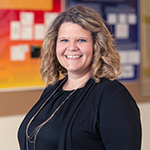
The COVID-19 pandemic has reinforced what higher education professionals have known for a long time—that a global education is essential because it prepares students for the interdependent world in which we now live.
It opens students’ eyes to their relative places in power and privilege structures; challenges them to be curious, flexible, and self-aware; develops their problem-solving and interpersonal skills; and builds their confidence. These are all essential to the coveted liberal education, which is why you will be hard-pressed to find a four-year institution without a global education office.
With mounting pressure for higher education to demonstrate its relevance, the good news is employers consistently report they are looking for the very competencies and skills study abroad fosters. This is especially true for employers under 40 who, according to the 2021 AAC&U’s “How College Contributes to Workforce Success: Employers Views on What Matters Most” report are “much more likely” to hire college graduates with global learning experiences.
That bad news is only 1.5% of college students actually do study abroad, despite the fact that surveys have shown more than 60% of college freshmen intend to.
There are many reasons for this discrepancy, but students report the biggest barrier are direct and indirect costs. Study abroad is incredibly expensive and requires students to step away from much-needed jobs, which disproportionately impacts lower-income families.
Looking to Latin America
As campuses attempt to return to normal life in the coming months, they should put access to international education at the top of their (what undoubtedly will be long and challenging) list. While every institution’s mission and circumstances should determine how they might increase access for all students they should consider short-term study abroad, cost-effective destinations, and non-traditional funding mechanisms as three options.
First, though many institutions have traditionally preferred full semester study abroad opportunities to the short-term, it is time to consider what the latter has to offer. When carefully designed, these experiences can achieve many of our institutional goals and build the competencies employers are looking for while being less cost-prohibitive.
They have the added bonus of being perceived as a safer option for students (and families) wary of a multi-month stay in a foreign country. While they may not be appropriate for all students (language majors who need extensive immersion, for instance), when not treated as simply a vacation or tour with passive student observers, short-term study abroad under the expert guidance of faculty can prove life-changing.
More from UB: Here’s the size of COVID’s impact on international students
Second, institutions should move away from Eurocentric models. While European exchanges have long been attractive to students for their established educational institutions and perceived safety (and absolutely still have a place for some curricula), our increasingly diverse student populations are now more willing than ever to look to the global south for their opportunities.
Latin American countries are especially attractive for American colleges as their proximity guarantees cheaper airfare, low cost of living, and shorter travel times (which equals more time on the ground). They also are full of academic and NGO partners open to collaboration and service-learning projects that ensure an immersive experience.
How coffee funds study abroad
Finally, institutions should develop more non-traditional funding mechanisms. Some are positioned to provide grants and scholarships out of existing funds, but for many institutions generating additional resources is necessary to expand access.
This is where we need to get creative. As an international relations professor who wanted to provide students with hands-on experience with sustainable development and international trade, I did this by creating the Warrior Coffee Project.
Though there are a lot of ins and outs of the project itself, the basics are very simple. My home institution, Lycoming College, purchases coffee from Dominican coffee farmers who host yearly May term classes. We buy this coffee for a fair price, serve it on campus and sell it in retail bags, and use the profits to subsidize student travel and fund our community-identified sustainable development projects.
In addition to increasing access to more students, we have used the funding mechanism to create truly exceptional opportunities for applied learning and community development.
Creating and executing short-term study abroad is challenging, but if we are truly committed to leveling the playing field and providing all students access to the opportunities which set them up for future success, we must commit ourselves to the hard work.
Caroline L. Payne is an associate professor and chair of the political science department at Lycoming College in Pennsylvania, where she directs the Interdisciplinary Dominican Republic Program and the Warrior Coffee Project.








